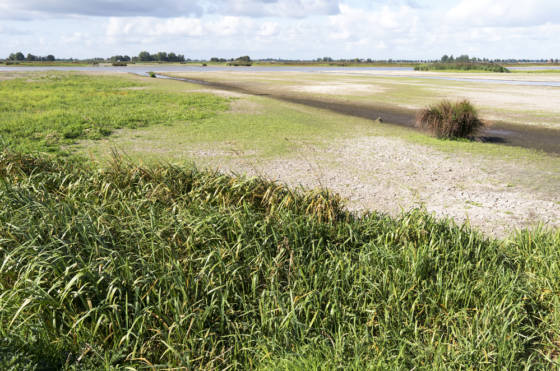Drought threatens industry, holding on to water is key


As the Netherlands enters a second week of an official water shortage, with temperatures again topping 30 degrees, experts say smart water management could be the key to a solution.
Big water users, such as the steel and chemical industries and food manufacturers have not had to interrupt production yet but they may soon join shipping and farming in experiencing the consequences of the drought, Roy Tummers, spokesman for the industrial water institute VEMW told the AD.
Reduced water levels are increasing the temperature and the salt content of the water and that can cause corrosion and wear to installations, particularly in the western provinces where salinisation is becoming a problem, he said.
The temperature of the water is another potential problem. ‘If the water is too warm companies may not be allowed to release water they have used for cooling and that can cause production loss as well,’ Tummers said.
‘It is really very odd for a country like the Netherlands to have a water shortage problem because we have so much of it,’ aquatic ecology professor Leon Lamers told broadcaster NOS. ‘The problem is that we get rid of it too quickly. That has to change.’
Rain water ends up in the sewers and is then released into the rivers and the sea but, said Lamers, water management should be focused on holding on to the water.
Water can be stored in nature, in cities and above and below ground, Lamers said.
In Spangen in Rotterdam, for instance, rain water is stored underground to use to keep the pitch at adjacent football club Sparta green and in Apeldoorn a similar ‘water cellar’ is used to keep 200,000 liters of rain water to use for the city’s green spaces.
The water boards are already working on ways to retain water. Changing waterways into meandering streams, for instance, will keep the water inland for longer. But, a spokesman for the union of water boards said, water will have to play a bigger role in planning new homes or industry.
Agriculture will also have to adapt. Farmers could grow crops which can cope with salt water and so-called paludiculture, or wet agriculture, could be a solution for the peatlands where water is currently pumped out, Lamers said.
Thank you for donating to DutchNews.nl.
We could not provide the Dutch News service, and keep it free of charge, without the generous support of our readers. Your donations allow us to report on issues you tell us matter, and provide you with a summary of the most important Dutch news each day.
Make a donation